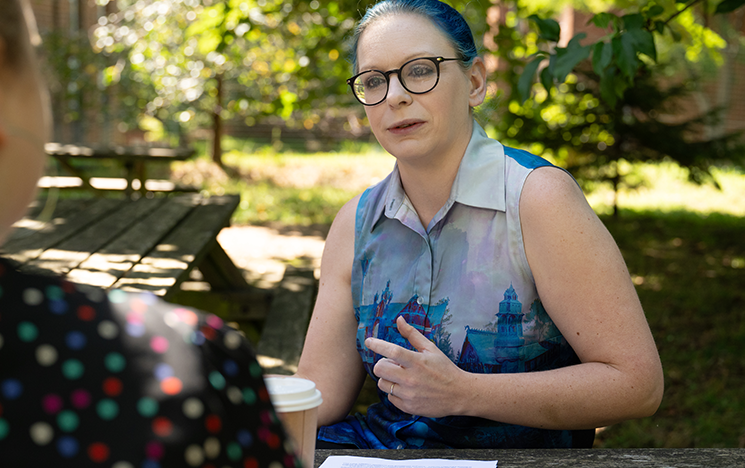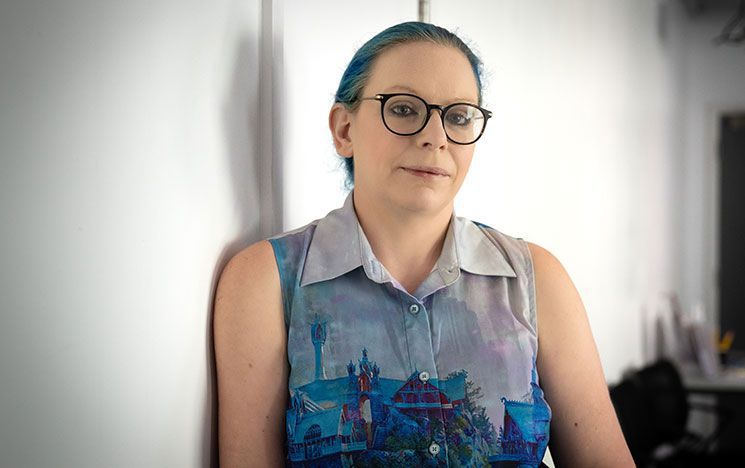Preserving cultural and collective memory - an interview with Victoria Grace Richardson-Walden
In an increasingly virtual world, digital approaches are key to capturing our personal and collective histories. For Professor Victoria Grace Richardson-Walden, learning from the experiences of those involved in digital heritage projects is key to both progressing a vital field, and to enhancing how we understand both our past and our future.
Introducing...
With a background in memory, media and film scholarship, Professor Victoria Grace Richardson-Walden joined Sussex back in 2016. In 2024, she was appointed Director of the Landecker Digital Memory Lab, which aims to explore how museums, memorial sites and archives can make better use of digital technologies in ensuring the sustainability of Holocaust memory in the digital age.
Drawing on expertise from the renowned Sussex Weidenfeld Institute of Jewish Studies and the Sussex Digital Humanities Lab, one of our 12 Centres of Excellence, Victoria and her team will also develop a ‘Living Database Archive’, a global collection that provides valuable insights from historical digital practices. The Archive is intended to support the work of practitioners in heritage, technology and the creative industries who are developing future digital Holocaust memory initiatives, along with that of academics studying the phenomenon.
We caught up with Victoria to discuss the distinction between history and memory, and the importance of harnessing technology to preserve the past, educate for the future, and enable the continuity of collective memory.
How have your research interests evolved over time?
I’m a first-generation scholar, and I was originally in two minds about whether to go to university. I worked in technical theatre and short film production before deciding to study for a BA in Media Arts, and later trained and worked as a teacher.
Over time, my interests developed in two very different genres of cinema: Hammer Horror and Holocaust film. I felt increasingly drawn to exploring themes of Holocaust and remembrance, and wrote my Masters thesis on how the Holocaust is remembered through different media and heritage forms.
Have you ever walked into a museum or watched a film and just felt something? In my early work, I called this the ‘affective mode’, and my PhD thesis focused on how Holocaust films and early digital projects generate this feeling. I became particularly interested in the role of digital screens in museum and memorial spaces, and I feel lucky that my interests have evolved in line with the field. Over the past decade, the sector has rapidly evolved its approach to engaging visitors through digital technologies, so it’s a fascinating space to explore.
How do themes of memory and remembrance intersect with our understanding of history?
When I teach, I introduce students to the idea that history is a record and a narrative of the past while memory is what we feel about the past – it isn’t static, but it flows. Memory is changeable, especially when we reflect on our lives and reconsider the parts of our stories we want (or don’t want) to tell.
This idea becomes far more complicated with collective or cultural memory, because you aren’t just looking at what an individual remembers. Instead, you’re trying to create a feeling about the past that resonates across communities through processes that are always in the making.
There’s often been a missing acknowledgement around the role that complex networks of people, objects and machines play in that making, which has become the major focus of my current work. We’re trying to go behind and beyond what’s seen at these interfaces to consider how we can capture the process of collective memory-making, especially within the digital space.
Periods of crisis lead to a real risk of objects, projects and people vanishing, and with that, history being rewritten. It’s critical for us to capture and preserve as much as we can.” PROFESSOR victoria grace richardson-WALDEN
Director of the Landecker Digital Memory Lab
What inspired you to begin developing plans for a Digital Memory Lab?
In a funny way, Covid had a huge influence – I was shielding and really missed chatting to people across the sector, so set up online discussions that attracted people as far afield as South Africa, Australia, Argentina and Japan. We became a community of people who shared ideas and discussed the challenges of pivoting to digital for Holocaust museums, memorial sites and archives. This was especially poignant as 2020 marked the 75th anniversary of the liberation of Auschwitz and the remaining concentration camps to the west of the site.
These discussions inspired my idea for a research project focusing on connective Holocaust commemoration, but developing the Lab has been a tough road. I was rejected for some big grants, but I persevered and began securing little pots of money to begin making progress. Eventually, I was able to secure major funding from the Alfred Landecker Foundation to get the project off the ground.
As the world has become more uncertain, I think our work has become even more pertinent. Periods of crisis lead to a real risk of objects, projects and people vanishing, and with that, history being rewritten. It’s critical for us to capture and preserve as much as we can.
How would you define the work of the Landecker Digital Memory Lab, and what are you trying to achieve?
We’re unique because we’re looking at digital Holocaust memory as a connective global phenomenon. We explore different kinds of practice and technology within the field, and also how these intersect.
Our work has always been underpinned by listening. So much of what we do has been informed by co-production workshops held a few years ago with participants from more than 100 global organisations including the National Holocaust Centre and Museum, the British Library and UNESCO. Our current work is directed by many of these recommendations around the future use of emerging technologies like artificial intelligence (AI) and virtual reality (VR).
Another major element of the Lab involves interviewing today’s memory-makers, and we’re also interested in the ‘invisible’ people involved in this form of content production, like filmmakers, programmers, designers, educators, archivists and curators. It's important for us to understand how the likes of museum guides or other front-of-house staff define how audiences engage with the subject too.
Essentially, we’re trying to make the Holocaust sector more digitally sustainable, and we’re aiming to capture digital memory as a process. We’re not simply interested in digital projects as outputs or texts in themselves, but in the production processes behind them as memory processes, and how these evolve and change over time.
How has the Sussex Digital Humanities Lab supported and shaped your project?
I think it’s changed the project entirely. I trained as a film philosopher, which basically meant that I sat in libraries, read books, watched films, came up with ideas and wrote stuff. I’m grateful for this theoretical grounding, but I’ve always felt frustrated by the idea of writing articles stuck behind a paywall, destined to be read by people who agree with you already.
The Sussex Digital Humanities Lab offers a culture that combines theoretical rigour with real creativity. Alongside writing books and publishing articles, we’re empowered to generate dialogue through the ‘humanness’ of technology, which has been crucial to this project. We’ve been doing things like writing blogs, cultivating digital communities, and collaborating with software engineers to build our own ‘Living Database Archive’ where people can remix their own research.
As someone with a background in theatre and film production, working in such an open, experimental and creative environment feels really special.

Why is Sussex such a fertile environment for research and knowledge-sharing?
Sussex is home to incredible people and an incredible culture. I remember walking through campus after my interview and feeling completely at home. There’s so much space to collaborate across different fields, and you’re encouraged to think beyond subject boundaries. Everyone is so nuanced, super friendly and happy to engage with each other’s work.
Many institutions can make you feel very isolated if you want to do things differently, but Sussex encourages you instead. I love that I can channel my passion into making an impact, and that no one cares if you have blue hair!
What advice would you give to people who are interested in pursuing a research career?
Be stubborn. If you feel like your work can make a change in the world, stick with it.
I’d also advise approaching research like a start-up. Bring the same kind of energy, perseverance and strategic thinking as you would to a business. Connect with experienced colleagues who can offer mentorship and advice.
Finally, try to enhance your public visibility. Many contacts will find you through Google, so think about how people can access your work beyond academic journals. And remember that it’s okay to hide away with your papers sometimes – it's a tradition of academia, and one I miss a little bit!
